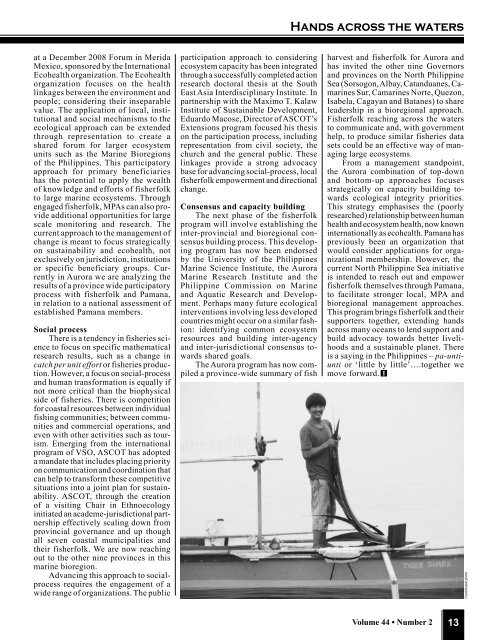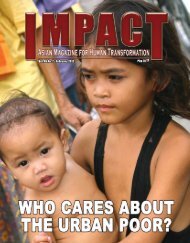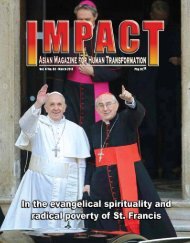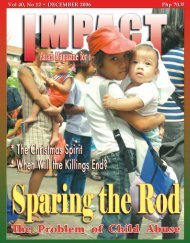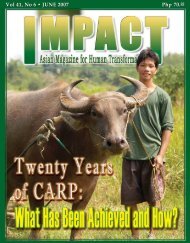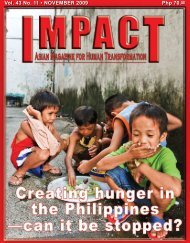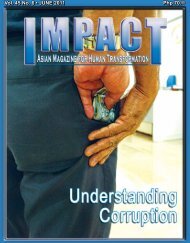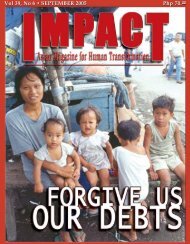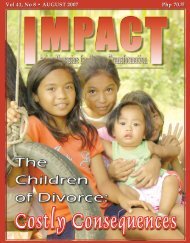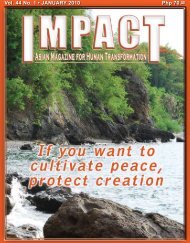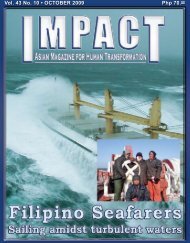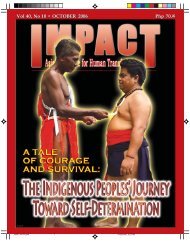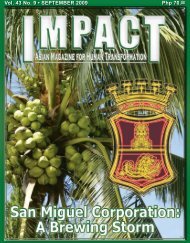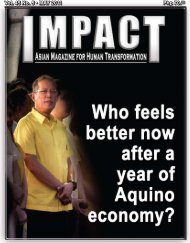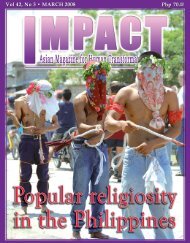Download - IMPACT Magazine Online!
Download - IMPACT Magazine Online!
Download - IMPACT Magazine Online!
Create successful ePaper yourself
Turn your PDF publications into a flip-book with our unique Google optimized e-Paper software.
Hands across the waters<br />
at a December 2008 Forum in Merida<br />
Mexico, sponsored by the International<br />
Ecohealth organization. The Ecohealth<br />
organization focuses on the health<br />
linkages between the environment and<br />
people; considering their inseparable<br />
value. The application of local, institutional<br />
and social mechanisms to the<br />
ecological approach can be extended<br />
through representation to create a<br />
shared forum for larger ecosystem<br />
units such as the Marine Bioregions<br />
of the Philippines. This participatory<br />
approach for primary beneficiaries<br />
has the potential to apply the wealth<br />
of knowledge and efforts of fisherfolk<br />
to large marine ecosystems. Through<br />
engaged fisherfolk, MPAs can also provide<br />
additional opportunities for large<br />
scale monitoring and research. The<br />
current approach to the management of<br />
change is meant to focus strategically<br />
on sustainability and ecohealth, not<br />
exclusively on jurisdiction, institutions<br />
or specific beneficiary groups. Currently<br />
in Aurora we are analyzing the<br />
results of a province wide participatory<br />
process with fisherfolk and Pamana,<br />
in relation to a national assessment of<br />
established Pamana members.<br />
Social process<br />
There is a tendency in fisheries science<br />
to focus on specific mathematical<br />
research results, such as a change in<br />
catch per unit effort or fisheries production.<br />
However, a focus on social-process<br />
and human transformation is equally if<br />
not more critical than the biophysical<br />
side of fisheries. There is competition<br />
for coastal resources between individual<br />
fishing communities; between communities<br />
and commercial operations, and<br />
even with other activities such as tourism.<br />
Emerging from the international<br />
program of VSO, ASCOT has adopted<br />
a mandate that includes placing priority<br />
on communication and coordination that<br />
can help to transform these competitive<br />
situations into a joint plan for sustainability.<br />
ASCOT, through the creation<br />
of a visiting Chair in Ethnoecology<br />
initiated an academe-jurisdictional partnership<br />
effectively scaling down from<br />
provincial governance and up though<br />
all seven coastal municipalities and<br />
their fisherfolk. We are now reaching<br />
out to the other nine provinces in this<br />
marine bioregion.<br />
Advancing this approach to socialprocess<br />
requires the engagement of a<br />
wide range of organizations. The public<br />
participation approach to considering<br />
ecosystem capacity has been integrated<br />
through a successfully completed action<br />
research doctoral thesis at the South<br />
East Asia Interdisciplinary Institute. In<br />
partnership with the Maximo T. Kalaw<br />
Institute of Sustainable Development,<br />
Eduardo Macose, Director of ASCOT’s<br />
Extensions program focused his thesis<br />
on the participation process, including<br />
representation from civil society, the<br />
church and the general public. These<br />
linkages provide a strong advocacy<br />
base for advancing social-process, local<br />
fisherfolk empowerment and directional<br />
change.<br />
Consensus and capacity building<br />
The next phase of the fisherfolk<br />
program will involve establishing the<br />
inter-provincial and bioregional consensus<br />
building process. This developing<br />
program has now been endorsed<br />
by the University of the Philippines<br />
Marine Science Institute, the Aurora<br />
Marine Research Institute and the<br />
Philippine Commission on Marine<br />
and Aquatic Research and Development.<br />
Perhaps many future ecological<br />
interventions involving less developed<br />
countries might occur on a similar fashion:<br />
identifying common ecosystem<br />
resources and building inter-agency<br />
and inter-jurisdictional consensus towards<br />
shared goals.<br />
The Aurora program has now compiled<br />
a province-wide summary of fish<br />
harvest and fisherfolk for Aurora and<br />
has invited the other nine Governors<br />
and provinces on the North Philippine<br />
Sea (Sorsogon, Albay, Catanduanes, Camarines<br />
Sur, Camarines Norte, Quezon,<br />
Isabela, Cagayan and Batanes) to share<br />
leadership in a bioregional approach.<br />
Fisherfolk reaching across the waters<br />
to communicate and, with government<br />
help, to produce similar fisheries data<br />
sets could be an effective way of managing<br />
large ecosystems.<br />
From a management standpoint,<br />
the Aurora combination of top-down<br />
and bottom-up approaches focuses<br />
strategically on capacity building towards<br />
ecological integrity priorities.<br />
This strategy emphasises the (poorly<br />
researched) relationship between human<br />
health and ecosystem health, now known<br />
internationally as ecohealth. Pamana has<br />
previously been an organization that<br />
would consider applications for organizational<br />
membership. However, the<br />
current North Philippine Sea initiative<br />
is intended to reach out and empower<br />
fisherfolk themselves through Pamana,<br />
to facilitate stronger local, MPA and<br />
bioregional management approaches.<br />
This program brings fisherfolk and their<br />
supporters together, extending hands<br />
across many oceans to lend support and<br />
build advocacy towards better livelihoods<br />
and a sustainable planet. There<br />
is a saying in the Philippines – pa-untiunti<br />
or ‘little by little’….together we<br />
move forward. I<br />
Contributed photo<br />
Volume 44 • Number 2 13


